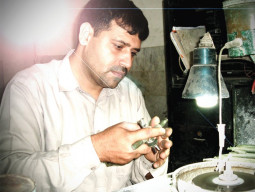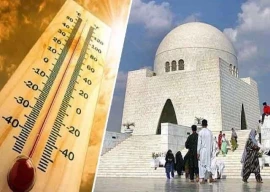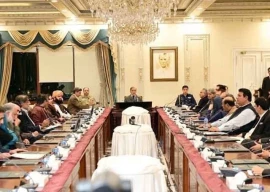
Every year there is temporary migration from various parts of the country to Wana, South Waziristan where farmers gather to make a livelihood from seasonal fruits and vegetables.
In Kari Kot Bazaar, about 10 kilometres southwest of Wana Rustam Bazaar, a large number of labourers from across the country settle for the summer months. These workers sleep without shelter and in the morning do business with local farmers or other buyers. After selling their produce, they work in fruit orchards and vegetable fields around Wana.

“Each year I come to Wana in this season,” said Khushal Khan Marwat, 41, a resident of Lakki Marwat. “In addition to earning a livelihood it’s also an escape from the heat this time of the year.” Khushal works in fruit orchards and is paid Rs400 a day.
“We live in the open and do not have to pay any rent,” said Khushal, while describing his unique lifestyle. “We cook our own food in the evening and the orchards’ owners feed us during the day.” He earns enough to take fruits and gifts for his family when he returns to his village.
Residents of Waziristan are known for their hospitality. There has not been a single incident where a labourer has been hurt or killed as residents of the area respect and honour their guests. Even the local Taliban do not interfere in the activities of these non-local labourers.
Labourers from Punjab are adept at making wooden boxes to hold fruits, and can be seen busy at their craft throughout the market. Other labourers pick fruits and carefully package them for Rs1,000 a day. The process requires skill and is done with great care in order to maintain the market value of the produce.
Facing challenges
Wana’s plains are very fertile and can be of much benefit to the country’s economy in addition to providing an income to tribesmen. However, due to security problems, Wana’s agriculture has been severely affected. The law and order has also created massive hurdles in transporting the fruit to other parts of Pakistan.
Gomal Zam Road, linking Wana with DI Khan, is used to transport fruits to other cities. When the road is closed due to security problems, the produce is taken via Wana Zohb, which is difficult to traverse and takes double the time. Often, the fruits rot before they reach their destination.
While talking to The Express Tribune, Umar Daraz, the owner of an apple orchard in Azam Warsak, also shed light on other difficulties. “Due to the severe shortage of power, we irrigate our fields using a generator,” said Daraz, adding this caused a significant portion of his income to be spent on petrol.
Daraz added the multiple security checkpoints set up along Gomal Zam Road delay trucks from reaching the market. Moreover, the entire road is shut for traffic when army convoys pass through the area. “Concessions should be given to fruit and vegetable trucks with respect to security checks so they can reach the market while the produce is still fresh.”
In July 2004, during former president Pervez Musharraf’s regime, economic sanctions were imposed on Wana tribesmen and fruits and vegetables were not allowed to be transported out of South Waziristan Agency. The sanctions, which continued for weeks, were imposed as the government was demanding the Ahmadzai tribe to handover two Taliban leaders. When a consensus was reached between the two parties, it was too late as all fruits and vegetables had already rotted.
Natural concerns
Aside from the perpetual security concerns, another persistent issue is the falling water table, which has caused some of Wana’s previously fertile fields to turn barren. Moreover, neither water channels nor tube wells are available to compensate.
Sahib Jan, a retired government engineer and resident of Wana, said the water shortage was a serious issue. “Farmers are increasingly dependent on tube wells,” he said. “However, the only way to solve this problem is to construct small dams in the western mountains.” Jan explained there were several suitable constructions sites for these dams and claimed the FATA Secretariat and FATA Development Authority had conducted feasibility studies in this regard.
“But not a single dam has been constructed, even though we need them to protect Wana’s agriculture,” lamented Jan, adding several orchards in areas like Darga Koth and Laman had dried up.
Despite this looming threat, however, fruit and vegetable markets in Wana are still going strong, with several local and non-local buyers seen purchasing the high-quality edibles.
Lal Muhammad Khan, the owner of a fruit stall in Rustam Bazaar, claimed there is always a rush in the fruit and vegetable markets. Additionally, dozens of trucks are loaded with goods from the market and sent to cities across the country, he added. “Tomatoes are supplied in great numbers in July while in August we sell apples. Wana’s fruits and vegetables always have a market because of the demand.”
Lack of support
But as far as developing the area’s agricultural sector is concerned, locals criticise the political administration for doing nothing.
Mir Khattam, a farmer, said the agricultural department in Wana had done nothing with respect to development. “There are no workshops and seminars for farmers, and authorities do not even provide new seeds or fertilizers,” he argued. “Whatever Wana’s agriculture is, it is because of the hard work by the tribesmen.”
Moreover, the government reportedly embezzled the agriculture tax, which the tribesmen agreed to give to the political administration to educate their children. The government earlier set up Musa Neka Public School under an agreement with the Ahmadzai tribe and then political agent Rustam Shah Mohmand in 1980. The funds were allegedly embezzled from this school.
Hayatullah, a resident of Wana, filed a writ petition under Article 199 of the Constitution at the Peshawar High Court (PHC). The petition demanded redress for the stolen funds. In 2012, the PHC’s chief justice ordered the National Accountability Bureau to conduct an enquiry into the matter. The enquiry is currently ongoing.
Published in The Express Tribune, July 23rd, 2013.
COMMENTS (1)
Comments are moderated and generally will be posted if they are on-topic and not abusive.
For more information, please see our Comments FAQ

























1714117028-0/BeFunky-collage-2-(1)1714117028-0-270x192.webp)




1714370039-0/ojwilson-(1)1714370039-0-270x192.webp)
-(1)1714378140-0/AliAminMaryam-(4)-(1)1714378140-0-270x192.webp)








A brilliant piece.